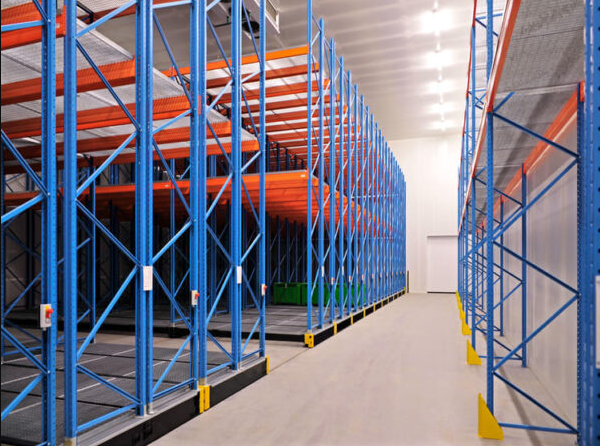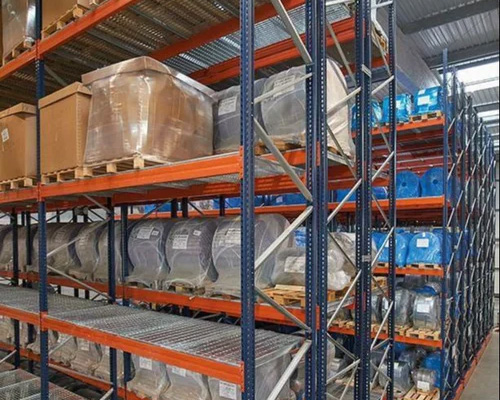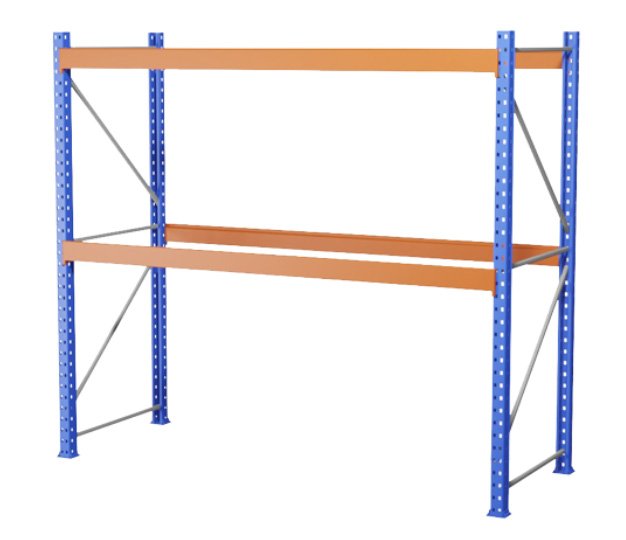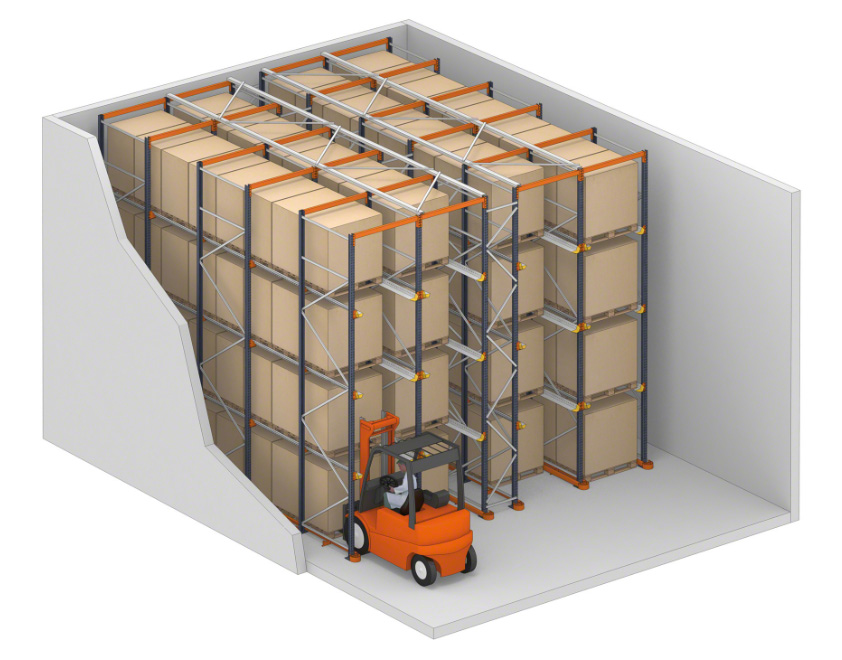
The best 8 Types of Pallet Racks in 2025
In Today’s fast-paced warehouse environment, choosing the right pallet rack system is essential for optimizing available space and enhancing operational efficiency. There are two main categories of pallet racking systems: static and dynamic. Each offers distinct benefits depending on your storage needs, warehouse layout, and the type of goods you’re handling.
This guide will break down the pros and cons of various types of pallet racks, helping you choose the system that best fits your warehouse’s requirements. Here’s a quick look at the 8 types of pallet racking systems in 2025 we’ll explore:
- Static Pallet Racks
- Selective Racks
- Double-Deep Pallet Racks
- Drive-In Racks
- Drive-Through Racks
- Dynamic Pallet Racks
- Push-Back Racks
- Pallet Flow Racks
Overview of Industrial Rack Systems for Warehouses
Rack systems are vital components of any warehouse operation. They allow businesses to make the most of their available space while ensuring that goods are stored safely and can be accessed quickly when needed. Understanding the different types of racking systems can help companies improve their overall workflow.
What is a Rack System?
A rack system is a storage structure that supports goods stored on pallets or other platforms. These systems help make the most of vertical space in warehouses by creating organized rows of products that can be accessed with forklifts.
Importance of Pallet Rack Systems in Warehousing
Proper pallet racking is crucial for improving the functionality of a warehouse. By organizing goods in a structured manner, businesses can streamline their operations, reduce handling times, and maximize storage efficiency. Choosing the correct racking system also ensures that the available warehouse space is utilized effectively.
Types of Pallet Rack Systems for Different Storage Needs
There are many types of pallet racking systems, each designed to serve specific storage needs. Whether you require high-density storage or easy access to all inventory, understanding the pros and cons of each system can help businesses select the right solution for their warehouse.
Understanding the different Types of Pallet Racks
Warehouse storage systems come in various forms, but the most effective systems often depend on selecting the right types of pallet racks. These systems are designed to optimize space, improve accessibility, and ensure efficient material handling within any warehouse.
Selective Pallet Rack: The Most Common Type
Among the types of pallet racks, selective pallet racks are the most widely used due to their flexibility and accessibility. This racking system allows direct access to every pallet, making it ideal for warehouses that handle a variety of inventory. It’s one of the best types of pallet racks for businesses that prioritize efficiency and ease of access.
Drive-in Pallet Rack: Maximizing Warehouse Space
Drive-in pallet racks are one of the high-density types of pallet racks, ideal for optimizing warehouse space. This system allows forklifts to drive directly into the rack structure, storing pallets deep within the system. If space-saving is your top priority, the drive-in system stands out among the different types of pallet racks available.
Push-Back Pallet Rack: Efficient Storage Solution
Push-back pallet racks offer a versatile solution and are a great option for warehouses that require dynamic storage systems. This type of pallet rack stores pallets on inclined rails, allowing gravity to help move pallets forward as one is removed. It’s one of the more dynamic types of pallet racks, perfect for First-In-Last-Out (FILO) inventory management.
Cantilever Racking System: Ideal for Long or Bulky Items
The cantilever racking system is perfect for long, bulky items like timber or pipes. This system allows for flexible storage without the need for vertical support columns, making it easy to load and unload large, unwieldy goods.
Pallet Flow Racking: Perfect for FIFO Operations
Pallet flow racking is ideal for FIFO (first-in, first-out) operations. Goods move forward as the front pallet is removed, ensuring that older inventory is always accessed first. This system is commonly used in industries where product rotation is critical, such as in food or pharmaceuticals.
Double Deep Pallet Racking: Increased Storage Density
Double deep pallet racking increases storage density by allowing pallets to be stored two deep. While it requires special forklifts, it optimizes space in busy warehouses with high storage demands.
Static and Dynamic Racking Systems for Your Warehouse
When selecting a racking system, it’s important to understand the difference between static and dynamic racking solutions. Static systems provide long-term storage stability, while dynamic systems offer efficient handling and movement of goods.
Static Racking Systems: Stability and Long-Term Storage
Static racking systems are best for products that do not require frequent access. These systems are more stable and provide long-term storage solutions. Common examples include the double deep and cantilever systems, which are ideal for storing large or bulky items that don’t need to be rotated frequently.
Dynamic Racking Systems: Maximizing Efficiency
Dynamic racking systems are designed to optimize space and streamline the movement of goods in busy warehouses. These systems include:
- Push-back pallet racks: Store multiple pallets in a single lane and allow the use of gravity to move goods forward as they are removed.
- Drive-in racking: Designed for high-density storage, allowing forklifts to enter and store pallets in deep lanes.
- Pallet flow racks: Perfect for FIFO operations, ensuring the first pallet placed in the system is the first removed.
Warehouse Storage and Industrial Racking Solutions
To optimize storage in a warehouse, it’s important to select a racking solution that meets the specific demands of the space, inventory, and operations.
Pallet Racking for Efficient Warehouse Space
By using the appropriate racking system, businesses can maximize their warehouse space and improve the organization of stored goods. Whether you opt for a drive-in rack or pallet flow system, the right choice will enhance operational efficiency.
Types of Industrial Racking for Warehouse Storage
Different types of industrial racking systems serve unique purposes in warehouse storage. Understanding these systems can help businesses make informed decisions about which solution is best suited for their needs, such as choosing between high-density storage options or more flexible, easy-access solutions.
Choosing the Ideal Storage Solution Based on Storage Needs
Selecting the correct racking system involves evaluating the size and layout of the warehouse. For businesses with limited warehouse space, solutions like drive-in racks or double deep systems can increase storage density without compromising accessibility.
Key Factors When Selecting the Right Type of Rack for Your Warehouse
When selecting the best racking system for your warehouse, consider factors such as the size and type of your pallets, your available space, and the type of inventory being stored.
Type of Pallet and Load Considerations
- The size and type of your pallets play a significant role in determining which rack system is best for your warehouse. Systems like drive-in racks are better for uniform loads, while selective racking is ideal for varying pallet sizes.
-
Optimizing Warehouse Space with the Right Rack System
- To make the most of your warehouse space, it’s important to choose the right combination of storage systems. High-density systems like double deep racking allow for more storage, while flow racking ensures efficient stock rotation.
-
Storage Solution Based on Warehouse Space and Industrial Racking Types
- Every warehouse has unique storage needs, and the right pallet racking system should be tailored to meet those needs. Whether it’s optimizing warehouse space with high-density storage systems or ensuring easy access with selective pallet racks, the right solution can make a huge difference in operational efficiency.
Conclusion: Finding the Right Warehouse Pallet Racking System
Choosing the right pallet racking system is critical for optimizing the efficiency of your warehouse. By selecting the appropriate industrial racking system, companies can improve their storage capacity, ease of access, and overall productivity.
Tailoring Your Racking System to Your Storage Needs
Selecting Between Static and Dynamic Racking Solutions
The choice between static and dynamic racking depends on your inventory turnover. Static systems are ideal for long-term storage, while dynamic racking offers increased efficiency for fast-moving goods.
What are the three types of racks commonly used in warehouses?
A: The three common types of racks used in warehouses include selective racks, push-back racks, and drive-in racking systems. These systems offer different benefits depending on the type of goods stored and the warehouse layout.
What is the most widely used pallet racking system?
B: Selective pallet racking is the most commonly used system due to its flexibility, ease of installation, and accessibility. It allows for direct access to each pallet, making it ideal for high turnover warehouses.
What is the alternative to a pallet rack system?
C: Alternatives to pallet rack systems include cantilever racks, which are perfect for storing long or bulky items, and compact storage racks, which maximize available space in the warehouse for non-palletized goods.
What is the difference between pallet racking and shelving?
D: Pallet racking is designed for heavy-duty storage of pallets and large goods, while shelving is typically used for lighter, smaller items that do not require forklift access.
What are the different types of rack rails?
E: Rack rails vary based on the system in use but can include teardrop rails, structural rails, and gravity rails, which are commonly used in dynamic systems like pallet flow racks.




